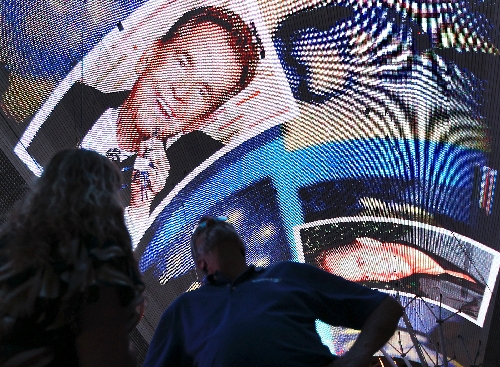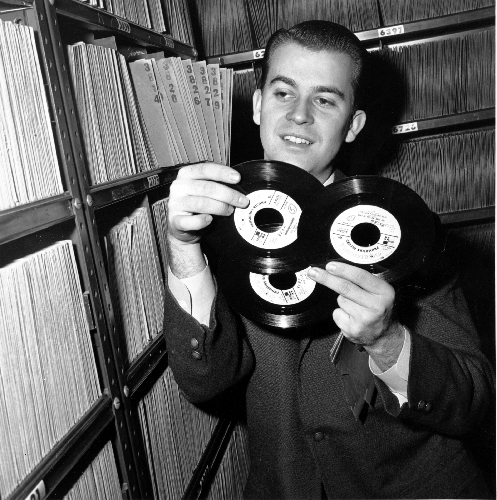‘American Bandstand’ host Dick Clark dead at 82
LOS ANGELES - Dick Clark stood as an avatar of rock 'n' roll virtually from its birth and, until his death Wednesday at age 82, as a cultural touchstone for boomers and their grandkids alike.
His identity as "the world's oldest teenager" became strained in recent years, as time and infirmity caught up with his enduring boyishness. But he owned New Year's Eve after four decades hosting his annual telecast on ABC from Times Square. As a producer and entertainment entrepreneur, he was a media titan; his Dick Clark Productions supplied movies, game shows, beauty contests and more to television. For a time in the 1980s, he boasted programs on all three networks.
Fremont Street was as close as Clark came to a live show venture in Las Vegas. In 2004, he attended a news conference with then-Mayor Oscar Goodman and previous owners of the Plaza to announce the showroom production "Rock, Roll & Remember," a live show and "minimuseum" drawn from Clark's vast collection of memorabilia.
Clark did not plan to perform in it, but would have taped video segments to host the show from screens. The project was announced in May for a fall debut, but was delayed by showroom renovations and faded away completely after Clark had a debilitating stroke that December.
Dick Clark Productions, run by Richard "RAC" Clark, continues to produce TV programming in Las Vegas, including the annual Academy of Country Music awards. In 2010, the Daytime Emmy Awards were staged at the Palms and included a tribute to Clark and "American Bandstand."
Equally comfortable chatting about music with Sam Cooke or bantering with Ed McMahon on "TV's Bloopers and Practical Jokes," Clark was among the Forbes 400 of wealthiest Americans.
Clark, who died of a heart attack Wednesday at a hospital in Santa Monica, Calif., also was part of radio as partner in the United Stations Radio Network, which provided programs to thousands of stations.
"There's hardly any segment of the population that doesn't see what I do," Clark said in 1985. "It can be embarrassing. People come up to me and say, 'I love your show,' and I have no idea which one they're talking about."
In the 1950s, Clark bridged the rebellious new music scene and traditional show business. He defended pop artists and artistic freedom, the Rock and Roll Hall of Fame said in an online biography of the 1993 inductee. He helped give black artists their due by playing original R&B recordings instead of cover versions by white performers, and he condemned censorship.
Clark joined "American Bandstand" in 1956 after Bob Horn, the host since its 1952 debut, was fired. A year later, Clark integrated the show with black dancers.
"It still wasn't acceptable for them to dance with white kids, so the blacks just danced with each other. We were waiting for the explosion, but it never happened," Clark told Pennsylvania Heritage Magazine in 1998. "The wonderful part about our decision to integrate then was that there were no repercussions, no reverberations, no battles at all; it just happened right there on a television screen in front of millions of people."
Under Clark's guidance, "Bandstand" went from a local Philadelphia show to a national phenomenon, introducing stars from Buddy Holly to Madonna. It was one of network TV's longest-running series as part of ABC's daytime lineup from 1957 to 1987.
"I played records, the kids danced, and America watched," was how Clark once described the series' simplicity. In his 1958 hit "Sweet Little Sixteen," Chuck Berry sang that "they'll be rocking on Bandstand, Philadelphia, P-A."
As a host, Clark had the smooth delivery of a seasoned radio announcer. As a producer, he had an ear for a hit record. He also knew how to make wary adults welcome this odd new breed of music in their homes.
Clark endured accusations that he was in with the squares. He acknowledged the complaints, saying, "I knew at the time that if we didn't make the presentation to the older generation palatable, it could kill it. So along with Little Richard and Chuck Berry and the Platters and the Crows and the Jayhawks ... the boys wore coats and ties and the girls combed their hair and they all looked like sweet little kids into a high school dance."
The stroke Clark suffered in 2004 affected his ability to speak and walk. That year, he missed his annual appearance on "Dick Clark's New Year's Rockin' Eve."
He returned the following year and, although his speech at times was difficult to understand, many praised his bravery, including other stroke victims.
Friends on Wednesday recalled a patient, encouraging man.
"He was there for every crisis of my life and there were many," Connie Francis said . "Without Dick Clark there would have been no career because I was ready to abandon it. Dick was the most principled man I ever met in this business and treated everyone the same way, even if you were the little guy."
Said Pat Boone: "Careers grew because of Dick Clark."
Clark was honored at the Emmy Awards in 2006, telling the crowd: "I have accomplished my childhood dream, to be in show business. Everybody should be so lucky to have their dreams come true. I've been truly blessed."
He was born Richard Wagstaff Clark in Mount Vernon, N.Y., in 1929. His father, Richard Augustus Clark, was a sales manager who worked in radio.
Clark idolized his older brother, Bradley, who was killed in World War II. In his 1976 autobiography, "Rock, Roll & Remember," Clark recalled how radio helped ease his loneliness and turned him into a fan of Steve Allen, Arthur Godfrey and other popular hosts.
From Godfrey, he learned that "a radio announcer does not talk to 'those of you out there in radio land.' A radio announcer talks to me as an individual."
Clark began his career in the mailroom of a Utica, N.Y., radio station in 1945. By age 26, he was a broadcasting veteran, with nine years' experience on radio and TV stations in Syracuse and Utica, N.Y., and Philadelphia. He held a bachelor's degree from Syracuse University.
In the 1960s, "American Bandstand" moved from black-and-white to color, from weekday broadcasts to once-a-week Saturday shows, and from Philadelphia to Los Angeles. Although its influence started to ebb, it still featured some of the biggest stars of each decade, whether Janis Joplin, the Jackson 5, Talking Heads or Prince. But Clark never did book two of rock's iconic groups, the Beatles and the Rolling Stones. Elvis Presley also never performed, although Clark managed an on-air telephone interview while Presley was in the Army.






























